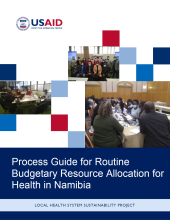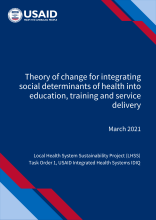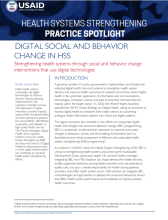Learning and knowledge sharing are fundamental to the LHSS Project. We invite you to search LHSS knowledge products and resources for the latest approaches, insights, and learning in the field of integrated health systems strengthening.

This process guide outlines an iterative process to support budgetary allocation decisions aligned with regional populations and needs as prioritized in the EHSP. The process guide proposes a broad decision-making framework that can be used to review current practices and move toward more efficient approaches in resource allocation.
This document describes the process to be followed for the regular revisions of the EHSP and presents important elements that support the updating, so that an EHSP that is a sustainable, equitable, and accessible—within financial and other constraints—is delivered to the population.
This PSCSE landscape report was compiled using evidence generated from a comprehensive documentary review and selected key informant interviews conducted to gain insight into the status of implementation of existing PPPs, and the challenges, lessons learned, and success stories.
The Namibian government has a long history of working with the private sector to deliver essential health services. However, the engagement between the Ministry of Health and Social Services (MOHSS) and private sector actors within the health sector is mostly through ad hoc interactions during national campaigns, planning processes and service delivery. Thus, there is a need for more-coordinated and more-strategic engagement to effectively leverage the private sector's capacity and strategically position the private sector’s role in advancing universal health coverage (UHC).

Given the complexity of the causes and effects of the SDoH and the multitude of stakeholders and interventions needed, this publication introduces the Theory of Change (ToC) that can help those seeking to develop interventions to address and mitigate the effect of the SDoH on health.
This brief includes a set of suggested competencies developed in collaboration with a diverse group of stakeholders from around the world who identified them as essential for the health workforce.
This report synthesizes learning from an in-depth examination of successful MOH efforts that have led to increased health budget execution. It offers a vision of good health budget execution, as well as promising practices in the areas of budget structure and processes and budget accountability.
This technical guidance document provides a summary of principal findings that highlight those complex factors including a literature review, surveys, resource mapping, case studies including key informant interviews, and the development of a theory of change.
This literature review seeks to identify, analyze, and document successful efforts to integrate Social Determinants of Health into health workforce education, training, and service delivery in low- and middle-income countries.
This case study examines how Côte d’Ivoire’s DREAMS program incorporates Social Determinants of Health elements into HIV service delivery, as well as the related processes and key lessons learned.
This case study describes and analyzes the Eswatini Nursing Council's efforts to strengthen the competence of nursing graduates to address the population’s health needs by introducing entry-to-practice competencies as the basis for a national licensing examination, and for incorporating Social Determinants of Health into these competencies.
This case study describes and analyzes Patan Academy of Health Science’s efforts and contributes to the knowledge base on how to maximize the positive impact of integrating Social Determinants of Health into the education and training of health workers.
The case study in Senegal focused on practical experiences and lessons learned when expanding financial protection to socially excluded and vulnerable groups.
The case study shows the literature and previous work on health equity to identify promising approaches and strategies from Senegal’s experience to ensure more equitable financial protection, particularly for underserved and socially excluded populations.

This brief explores ways in which digital tools and systems can be used successfully and responsibly to advance SBC interventions in support of health system strengthening, and provides recommendations for future programming and areas of research.
